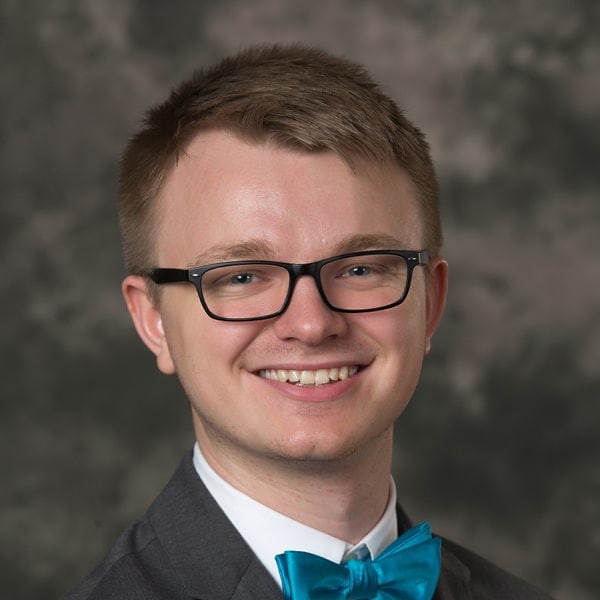What is your background in audiology?
When I startedlege, I was a linguistics major who thought I wanted to get a PhD. After a semester of modifying vowel formants, I swore off research as something I could NEVER do for my whole life and decided that speech-language pathology felt like a more applied use of my interests.

However, my very first semester, a professor came in to give a guest lecture on hearing loss caused by chemotherapy. As a failed chemical engineering student, I was amazed by the idea that medications could have these unexpected effects that could result in significant consequences, even for survivors. I started volunteering in his lab and eight years later I graduated with my AuD and PhD from the same lab.
I continued studying ototoxicity during my PhD, though I started studying the impacts of HIV medications during the later years. After graduating, I began a postdoc at the National Center for Rehabilitative Auditory research working on using statistical learning to predict hearing loss following cancer treatments. Over the summer, I opened my own lab that is studying patients taking HIV medications and hope to be able to build similar models that will predict their risk of hearing loss.
During undergrad, I began volunteering for the Student Academy of Audiology (SAA) and attended my first AAA Annual Conference. I’ve stayed an active volunteer since then, serving as president of the SAA in 2019-2020. Since graduating, I’ve served on the Academy’s Executive Director Search Committee and Nominations Committee, chaired the posters sub-committee for the AAA Annual Conference, and been a part of the Guidelines and Strategic Documents Committee (GSDC). I still serve on the GSDC as well as being an advisor to the Professional Development Council and a member of the Honors and Awards Ad Hoc Task Force. Outside of the Academy I have been a part of CAPCSD’s AuD Externship Task Force and am the co-founder of an LGBTQ+ affinity group called Queer Empowerment for Audiologists, Researchers, and Students (QuEARS).
Why do you volunteer with the Academy?
The Academy is my professional home. I’ve been volunteering with the Academy for 10 years now, and during that time I’ve met some of my best friends. Every year, I look forward to the AAA Annual Conference because I know that I’ll be learning from the best minds in our field alongside some of the best people in our field and that I will leave feeling refreshed, excited, and with more collaborations than I know what to do with.
Outside of those personal specifics, the Academy is the largest organization in the world focused on advocating only for audiologists. I know that when the Academy goes to Capitol Hill or steps into a meeting with a manufacturer, the only people that we’re there to represent are audiologists, just like me.
I’m also incredibly proud of the Academy’s push to update our Clinical Practice Guidelines and other important documents. These are the backbone of our national and local advocacy and also provide standards that we can point to with our patients and with other professionals to demonstrate that we are the highest authorities in hearing and balance care and that we have the necessary education and practices to provide a better quality of life for our patients. I’m proud to be a part of an organization that puts me first as a member while still centering patients. I’m excited for the future of the Academy and because of our practice of making sure that everyone who wants to can volunteer, I know that I will be a part of that future!
What is one thing that you can say volunteering has done for you and your personal success as an Audiologist?
Volunteering for the Academy is part of what got me my current job! When I was interviewing for my postdoc, one of the aspects that the interviewer’s highlighted was my service with the Academy. We talked about the importance of service to the profession and how it builds a network and audience. With my broader network of Academy volunteers and friends, I know that if I need to ask a question there’s an expert out there ready to answer.
Additionally, because of my time volunteering with the Academy, I hear a lot more about what audiologists around the country are experiencing at work and it makes me a better researcher. Because I’m able to connect not only my clinical experience to my work but also the clinical experiences of others, it’s easier to see the barriers or questions emerging and think of the right research questions to help get the answers we need!
If you were a crayon, what color would you be?
In researching to answer this question, I learned that there are a LOT more crayons than the ones I knew about!
Based on that research, I’d have to say that “Metallic Seaweed” is the perfect combination of a fantastic name and blue-green colors that I tend to gravitate towards.
What was your most prized toy as a child?
Growing up, I didn’t play with toys very often. I spent almost all of my free time until middle school reading books. One of my favorite parts about life post-grad school is having the time to read for pleasure again. While the specific books may have changed, I’m still a sucker for a good fantasy novel. The more complicated the magic, the better!
Related Posts
Volunteer Spotlight: Courtney Glavin, AuD
What is your background in audiology? I fell into audiology just like many people do. I have a family member with a learning disability, so…
Volunteer Spotlight: Nancy Silbernagel, AuD
What is your background in audiology? I received my master’s degree in communication disorders from the University of Minnesota, and obtained my AuD from A.T….
Volunteer Spotlight: Julie Honaker, PhD
What is your background in audiology? I fell in love with the field during my sophomore year of college when I chose communication sciences and…
